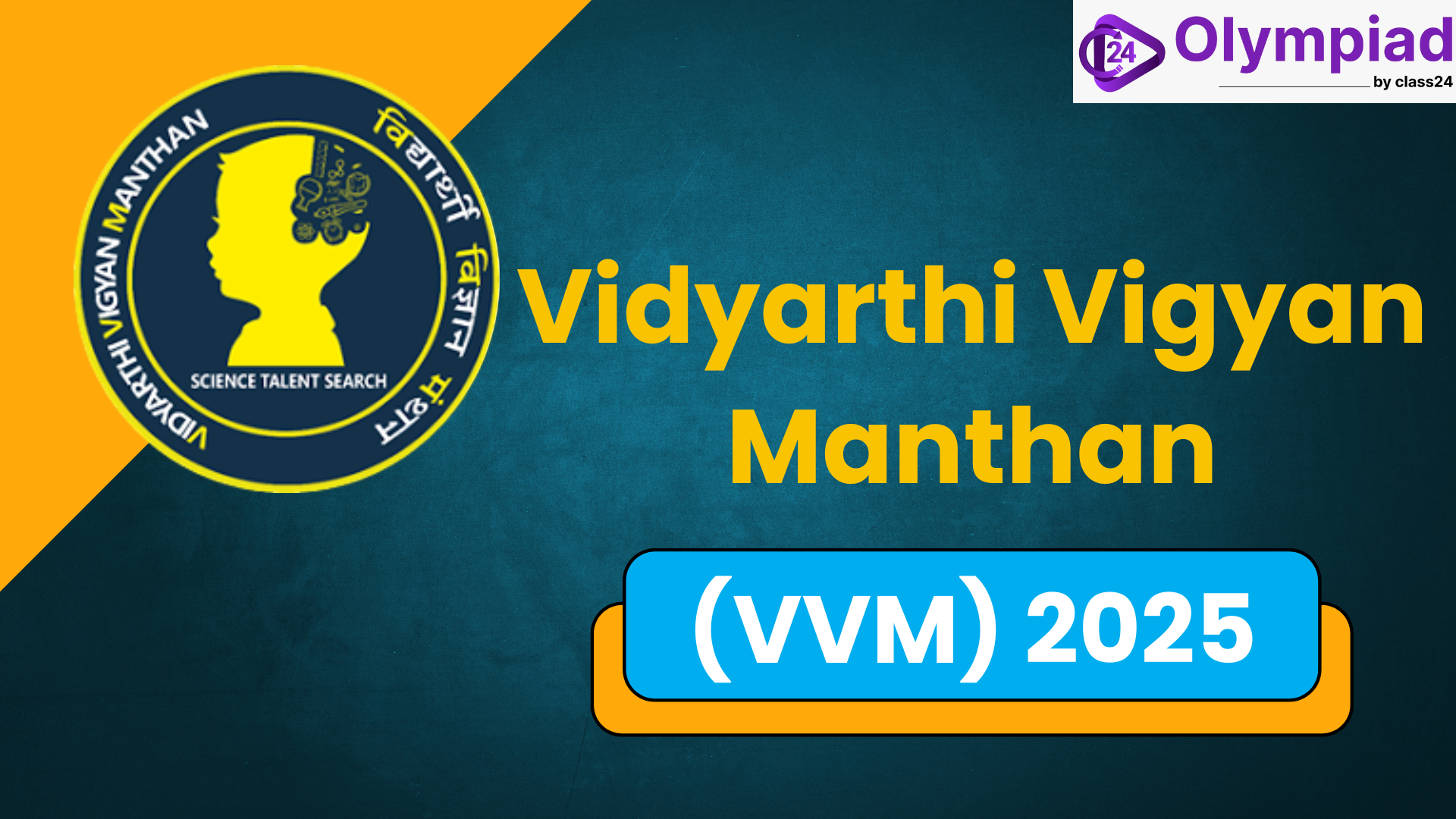
The Vidyarthi Vigyan Manthan (VVM) is the biggest digital-based talent search science examination in India that aimed at recognizing and inculcating the young scientific talent. Developed by Vijnana Bharati (VIBHA) with National Council of Educational Research and Training( NCERT) and National Council of Science Museums( NCSM), VVM 2025 is a program to popularize science among school students in Class VI to XI. VVM is not merely an examination, but an achievement of scientific potential and hence the examination gives the students exposure to the contributions made by India on science and technology, takes them to the national research organizations and offers them the guidance of great minds in science. In the 2025-26 version, VVM will be global with its International Edition - Sanskriti Pratibha Contest in the Middle East, viz. Bahrain, Kuwait, Oman, Qatar, Saudi Arabia and UAE.
Vidyarthi Vigyan Manthan Exam 2025 is a country-wide science competition that helps school students from Classes 6 to 11 learn and get interested in science. Jointly organized by Vijnana Bharati (VIBHA), NCERT, and the National Council of Science Museums (NCSM), VVM hopes to encourage students to learn more about science outside of their textbooks and to learn about the country’s old science and inventions. The exam takes place on a computer, uses different languages spoken around the country, and checks how well students know school topics, as well as logic and the main science ideas from India. High-performing students get the chance to join state or national science camps, take part in science workshops, and go on visits to some of the top research labs in India.
VVM 2025 is the first exam in the country at national level, a talent test in science with the sole objective of creating the interest in science as well as Indian contribution to science and technology. The scheme incorporates Science Promotion, Skill India and Digital India programs.
| Aspect | IOAA (Senior) | IOAA-Jr (Junior) |
|---|---|---|
| Target Age Group | Approx. 16 to 19 years (high school students) | Under 16 years |
| Purpose | Advanced competition in astronomy and astrophysics | Introduction to astronomy and astrophysics for younger students |
| Exam Components | Theoretical exams, data analysis, observational rounds, team events | Theoretical tests, practical activities, sky observations |
| Duration | 3 to 4 days of exams and activities | Typically 5 days, includes written, hands-on, and observational rounds |
| Level of Difficulty | Higher, focused on deeper concepts and advanced problems | Moderate, focusing on fundamental concepts and skills |
| Organizers | Tata Institute of Fundamental Research (TIFR), HBCSE | Ministry of Education and Research, Romania; local organizers |
| Selection Process | National Olympiads followed by international selection | National exams and orientation camps leading to international participation |
| Focus Areas | Astronomy, astrophysics, physics, math | Basic astronomy, physics, math, practical observation |
| Location of 2025 Event | Mumbai, India | Piatra Neamț, Romania |
| Participation | Over 60 countries, 300+ students | Smaller scale, younger participants from multiple countries |
The next staging of Vidyarthi Vigyan Manthan (VVM) 2025 will commence on July 15, 2025 with the registration of students and close on September 30, 2025. The introduction, participant familiarization with online platform, is planned on the dates between October 15 and October 31, 2025, with so-called mock tests. The National Level Online Examination is planned to take place in two time periods in November 24, 2025. The result, discussions, and camps will become next and will culminate in the National Camp in May 2026 with the best-performing students. Here is the list imp dates for VVM Exam 2025
| Event | Date |
|---|---|
| Registration Opens | 1 July 2025 |
| Registration Closes | 30 September 2025 |
| Study Material Release | 16 August 2025 |
| Mock Tests Start | 1 September 2025 |
| Level I Exam | 28 October – 2 November 2025 |
| Level I Result | 7 November 2025 |
| Level II Exam | 19 & 23 November 2025 |
| Level II Result | 27 November 2025 |
| State Camps | 21 December 2025 – 4 January 2026 |
| National Camp Date | 30 January 2026 (venue announcement) |
The Vidyarthi Vigyan Manthan (VVM) exam 2025 program is open to all students in Classes 6 to 11 across India. The test is designed to include students who follow the curriculum of CBSE, ICSE, and State Boards. Thanks to being performed online and available in 12 languages, VVM helps students from different regions and language groups participate. There are no set educational requirements, so any young student eager about science and math can enter. here is the VVM 2025 eligibility criteria:
| Class | Group Name |
|---|---|
| Classes 6–8 | Junior Group |
| Classes 9–11 | Senior Group |
Note:
VVM syllabus 2025 is conceived by to kindle scientific curiosity and awareness among the students of classes 6th to 11th. It incorporates NCERT standard science with India's best scientific heritage, logical deductions and modern developments. The VVM exam syllabus aims at encouraging critical thinking, bringing out innovation and understanding of Indian scientific contributions.
| Section | Level I Weightage | Level II Weightage |
|---|---|---|
| Science & Maths (NCERT/State Board) | 50% | 60% |
| Indian Contributions to Science | 20% | 20% |
| Life Story of Dr. Satyendra Nath Bose | 20% | 10% |
| Logic & Reasoning | 10% | 10% |
The purpose of the VVM exam structure 2025 is to identify students’ understanding of science, math, and the ability to reason logically. There are two parts in the exam, and all questions are in a multiple-choice format. The first section deals with science in ancient India and the life of Dr. Shanti Swarup Bhatnagar, while the other section is based on usual school subjects and requires critical thinking. Students in Classes 6 to 11 find the 90-minute exam time to be within their reach and covers a substantial range of content. SATs are provided in different languages to make sure as many people can take them as want to. Here is the exam format of VVM 2025:
| Level | Total Marks | Total Questions |
|---|---|---|
| Level I | 100 | 100 MCQs |
| Level II | 100 | 50 MCQs (2 marks each) |
| Level III | Varies (Application & Practical Tasks) | Multiple |
| Level IV | Varies (Innovation & Leadership Activities) | Multiple |
Marking Scheme of VVM exam 2025
Note:
The process to VVM registration 2025 is extremely easy and entirely remote. Students have to log in to the official site www.vvm.org.in in order to complete their vvm 2025 registration strats from July 1, 2025 till 30 September 2025 by using an authentic email address and a working cell number. Once they have logged in, they should complete their personal and school information, choose their category of classes (6 to 8 or 9 to 11) as well as the language version of the exam.
| Event | Date |
|---|---|
| Registration Opens | 1 July 2025 |
| Registration Closes | 30 September 2025 |
| Level I Exam | 28 October – 2 November 2025 |
| Level II Exam | 19 & 23 November 2025 |
| Level III- State Camps | 21 December 2025 – 4 January 2026 |
| Level IV- National Camp Date | 30 January 2026 (venue announcement) |
VVM Registration Fee:
Tip: Schools can bulk upload a number of students at a time
Vidyarthi Vigyan Manthan gives students the chance to learn more about science and enhance their critical thinking skills. The Indian National Science Olympiad provides opportunities to learn about India’s scientific past and promotes creativity and originality among youth. VVM identifies and fosters young scientists through financial aid, mentoring, and access to national-level science events. It also inspires students to pursue science further than the classroom and get acquainted with more advanced laboratories and institutions.
By participating in Vidyarthi Vigyan Manthan, students can build knowledge in science and become better critical thinkers. The purpose of the program extends beyond an exam to help students study India’s scientific background and motivate them to be innovative and creative. VVM supports talented students by offering scholarships, mentorship, and giving them the chance to take part in science camps across India. Doing this also helps students perform better in science outside the classroom and access advanced science institutions and research. Here is the list of VVM Awards and recognitions. Here is why you should participate in VVM 2025 exam:
The sharp study plan that supports all these things, including the effective coverage of the syllabus, enhancement of conceptual clarity and development of problem solving skills is essential to achieve good scores in Vidyarthi Vigyan Manthan (VVM) 2025 exam. The tips given below will enable you to do better at Level I and Level II. Here's how to to prepare for VVM exam:
1. Read Study Material of VVM Completely
Read the official VVM study material to learn all the significant topics and examples.
2. Update NCERT and State board Science Syllabus
Go over NCERT textbooks and your state boards to brush on a good fundamentals.
3. Mock Tests Practice Fairly Often
To do better in exams, practice mock papers so that one is familiar with the pattern.
4. Speed and Accuracy Work
Emphasis should be made on the speed of solving questions without careless errors.
5. Enhance Logical and Rational abilities
Study those questions about analysis, reasoning and puzzling to beat the scores.
VVM 2025 exam encourages young students in India to approach science with enthusiasm and attention. Thanks to online exams and support for mentorship, scholarships, and exposure to science camps and research, VVM develops innovators and thinkers of the future. This way, students from all kinds of schools and countries can study together through the curriculum, since it is offered in several regional dialects. With the help of organizations such as Vijnana Bharati (VIBHA), NCERT, and the National Council of Science Museums (NCSM), VVM fosters India’s future scientists and the habit of asking scientific questions.
Download free study resources for Vidyarthi Vigyan Manthan (VVM) 2025 – Section A. Access subject-wise PDFs to strengthen your preparation.
Boost your exam preparation with our curated free resources for the Vidyarthi Vigyan Manthan (VVM) 2025 – Senior Group. Access subject-wise module samples and practice tests to strengthen your concepts and excel in the competition.
Download subject-wise free resources for the Vidyarthi Vigyan Manthan (VVM) 2025 – Junior Group. Access module samples and a practice test to improve your preparation.




Leave a Comment